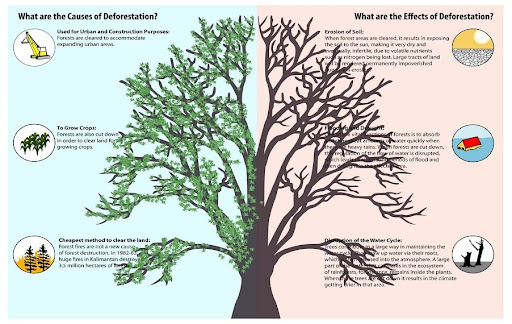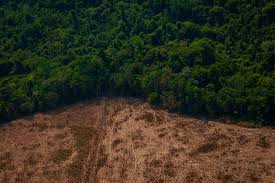Large-scale forest clearance, or deforestation, has emerged as a critical environmental concern. It entails the removal of trees for urban growth, agriculture, and other purposes. The climate, biodiversity, and livelihoods of those who depend on forests are all greatly impacted by this process. For sustainable development to occur, it is essential to comprehend the origins, consequences, and remedies of deforestation.
Causes of Deforestation
Agricultural Expansion:

The growth of agriculture is one of the main causes of deforestation. Due to rising food prices brought on by an expanding global population, forests are being turned into agricultural land. This covers both large-scale commercial agriculture—such as soy, palm oil, and cattle ranching—and subsistence farming. In addition to clearing large tracts of forest, these activities deteriorate soil quality and cause habitat loss.
Urbanization and Infrastructure Development:

Deforestation is mostly caused by infrastructure development and urbanization. Forests are cut down to provide room for homes, roads, and other infrastructure as cities grow. In addition to directly causing the loss of trees, this urban development also damages ecosystems, upsetting the migratory patterns and habitats of wildlife. The issue is made worse by the building of roads, dams, and mining operations, which frequently cause lasting environmental harm.
Environmental Impact
Loss of biodiversity:
Biodiversity is significantly impacted by deforestation. Numerous plant and animal species—many of which are endemic, meaning they can only exist in their natural habitat—may be found in forests. The loss of genetic variety, the extinction of species, and the disturbance of ecological processes are all caused by the degradation of these ecosystems. The loss of biodiversity has far-reaching effects on the resilience and stability of ecosystems.
Climate Change:

Because they absorb carbon dioxide during photosynthesis, forests are essential for controlling the planet’s temperature. This equilibrium is upset by deforestation, which releases large amounts of carbon dioxide into the atmosphere and fuels global warming. Furthermore, the removal of trees diminishes the planet’s ability to store carbon, intensifying the consequences of global warming. Rising sea levels, more intense weather occurrences, and changed weather patterns are all caused by this.
Socio-Economic Impact
Impact on Indigenous Communities

Indigenous groups are frequently disproportionately impacted by deforestation because they depend on trees for their livelihoods, cultures, and customs. These communities may experience economic hardship, dislocation, and loss of traditional knowledge as a result of the destruction of their forests. Furthermore, disputes over resources and land rights frequently occur, further marginalizing indigenous groups and endangering their way of life.
Economic Consequences
Although the sale of timber and the conversion of land can result in short-term economic benefits, deforestation frequently has long-term negative effects on the economy. Degradation of forests impacts ecosystem services that are essential to agriculture and other businesses, like pollination, soil fertility, and water management. The economy may suffer in the long run from higher expenses and lower productivity brought on by the loss of these services.
Solutions to Deforestation
Reforestation and Afforestation

The two main tactics used to stop deforestation are afforestation and reforestation. While afforestation refers to planting trees in regions that were not previously forested, reforestation entails planting trees in deforested areas. These methods enhance carbon sequestration, support wildlife habitat restoration, and help restore ecosystems. Reforestation initiatives that are successful must be well planned, choose the right tree species, and engage the local community.
Sustainable Land Management
Reducing deforestation requires putting sustainable land management techniques into practice. Promoting agroforestry—the integration of trees into agricultural landscapes—and implementing environmentally friendly farming practices are two examples of how to do this. Forest protection requires strong enforcement of laws prohibiting unlawful logging and land conversion, as well as policies and incentives that favor sustainable land use.
Policy and Global Efforts
International Agreements and Initiatives
In order to combat deforestation, international agreements and activities are essential. The Paris Agreement and other agreements highlight how crucial forest conservation is to reducing the effects of climate change. Developing nations receive financial incentives to participate in sustainable forest management and minimize deforestation through programs like REDD+ (Reducing Emissions from Deforestation and Forest Degradation). Governments, non-governmental organizations, and the commercial sector must work together to make these projects successful.
Corporate Responsibility and Consumer Awareness
In the battle against deforestation, consumer awareness and corporate responsibility are essential. To guarantee responsible forest management, businesses can embrace certification programs like the Forest Stewardship Council (FSC) and adopt sustainable procurement practices and zero-deforestation policies. Making educated decisions, purchasing environmentally friendly goods, and pushing for corporate responsibility and transparency are all ways that consumers can help. Businesses may adopt more sustainable practices as a result of public demand.
In summary
There are serious environmental, socioeconomic, and cultural issues associated with deforestation. Effective remedies must be implemented through a diverse strategy engaging individuals, corporations, and governments to address the underlying causes of the problem. We may work toward a future where human needs and environmental health are balanced by encouraging sustainable land management, lending support to reforestation initiatives, and spreading knowledge of the value of forests. For the sake of our world and future generations, action must be taken now.
Share this content:














+ There are no comments
Add yours